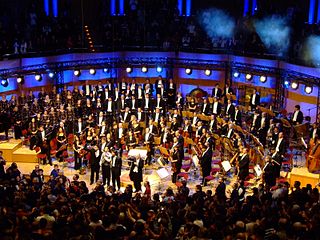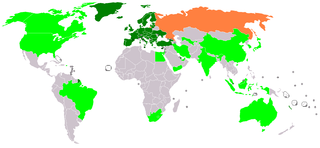A massively multiplayer online role-playing game (MMORPG) is a video game that combines aspects of a role-playing video game and a massively multiplayer online game.
A realm is the dominion of a king or queen; a kingdom. Realm may also more broadly refer to everything which falls within a certain set of parameters.
A multiplayer video game is a video game in which more than one person can play in the same game environment at the same time, either locally on the same computing system, on different computing systems via a local area network, or via a wide area network, most commonly the Internet. Multiplayer games usually require players to share a single game system or use networking technology to play together over a greater distance; players may compete against one or more human contestants, work cooperatively with a human partner to achieve a common goal, or supervise other players' activity. Due to multiplayer games allowing players to interact with other individuals, they provide an element of social communication absent from single-player games.
A massively multiplayer online game is an online video game with a large number of players to interact in the same online game world. MMOs usually feature a huge, persistent open world, although there are games that differ. These games can be found for most network-capable platforms, including the personal computer, video game console, or smartphones and other mobile devices.

The Symphonic Game Music Concerts are a series of award-winning orchestral video game music concerts first performed in 2003 at the Gewandhaus in Leipzig, Germany, notable for being the longest running and the first of their kind outside Japan. They are produced by Thomas Böcker and performed by various orchestras conducted by Andy Brick (2003–2007), Arnie Roth, Niklas Willén and Eckehard Stier.
A cooperative video game, often abbreviated as co-op, is a video game that allows players to work together as teammates, usually against one or more non-player character opponents (PvE). Co-op games can be played locally using one or multiple input controllers or over a network via local area networks, wide area networks, or the Internet.

A regional transmission organization (RTO) in the United States is an electric power transmission system operator (TSO) that coordinates, controls, and monitors a multi-state electric grid. The transfer of electricity between states is considered interstate commerce, and electric grids spanning multiple states are therefore regulated by the Federal Energy Regulatory Commission (FERC). The voluntary creation of RTOs was initiated by FERC in December 1999. The purpose of the RTO is to promote economic efficiency, reliability, and non-discriminatory practices while reducing government oversight.
National Grid plc is a British multinational electricity and gas utility company headquartered in London, England. Its principal activities are in the United Kingdom, where it owns and operates electricity and natural gas transmission networks, and in the Northeastern United States, where as well as operating transmission networks, the company produces and supplies electricity and gas, providing both to customers in New York and Massachusetts.

A transmission system operator (TSO) is an entity entrusted with transporting energy in the form of natural gas or electrical power on a national or regional level, using fixed infrastructure. The term is defined by the European Commission. The certification procedure for transmission system operators is listed in Article 10 of the Electricity and Gas Directives of 2009.
ENTSO-E, the European Network of Transmission System Operators, represents 40 electricity transmission system operators (TSOs) from 36 countries across Europe, thus extending beyond EU borders. ENTSO-E was established and given legal mandates by the EU's Third Package for the Internal energy market in 2009, which aims at further liberalising the gas and electricity markets in the EU. Ukrainian Ukrenergo became the 40th member of the association on 1 January 2024.
ISO is the abbreviation for the International Organization for Standardization.
A healer is a type of character class in video gaming. When a game includes a health game mechanic and multiple classes, often one of the classes will be designed around the restoration of allies' health, known as healing, in order to delay or prevent their defeat. Such a class can be referred to as a healer. In addition to healing, healer classes are sometimes associated with buffs to assist allies in other ways, and nukes to contribute to the offense when healing is unnecessary.

The European Telecommunications Standards Institute (ETSI) is an independent, not-for-profit, standardization organization operating in the field of information and communications. ETSI supports the development and testing of global technical standards for ICT-enabled systems, applications and services.

Thomas Böcker is a German producer. He is the founder of Merregnon Studios and creative director of his orchestral music projects Merregnon and Game Concerts.
The European Union's Third Energy Package is a legislative package for an internal gas and electricity market in the European Union. Its purpose is to further open up the gas and electricity markets in the European Union. The package was proposed by the European Commission in September 2007, and adopted by the European Parliament and the Council of the European Union in July 2009. It entered into force on 3 September 2009.

Merregnon Studios is a company based in Dresden, Germany, founded by Thomas Böcker. It produces recordings and concerts worldwide, including the orchestral Merregnon and Game Concerts series.
Massively multiplayer online real-time strategy game (MMORTS) mixes the genres of real-time strategy and massively multiplayer online games, possibly in the form of web browser-based games, in which a very large number of players interact with one another within a virtual world. Players often assume the role of a general, king, or other type of figurehead leading an army into battle while maintaining the resources needed for such warfare. The titles are often based in a sci-fi or fantasy universe and are distinguished from single or small-scale multiplayer RTSes by the number of players and common use of a persistent world, generally hosted by the game's publisher, which continues to evolve even when the player is offline.
Swissgrid, based in Aarau and Prilly, is the Swiss transmission grid operator. It is subject to supervision by the Swiss Federal Electricity Commission ElCom.




